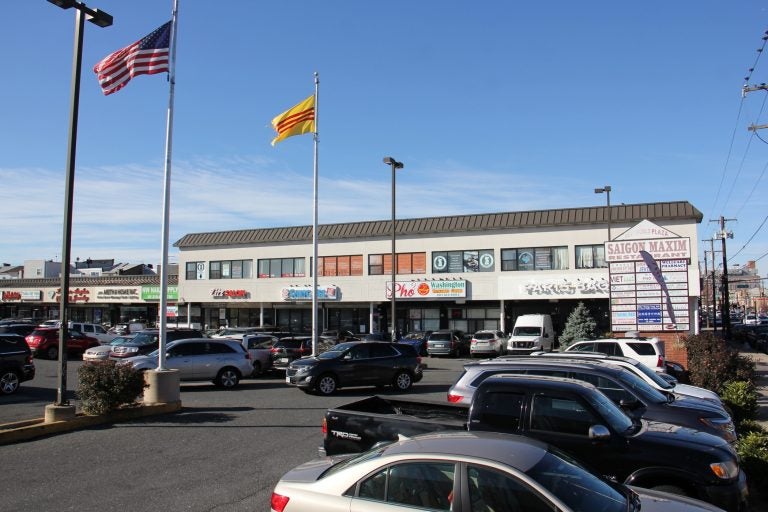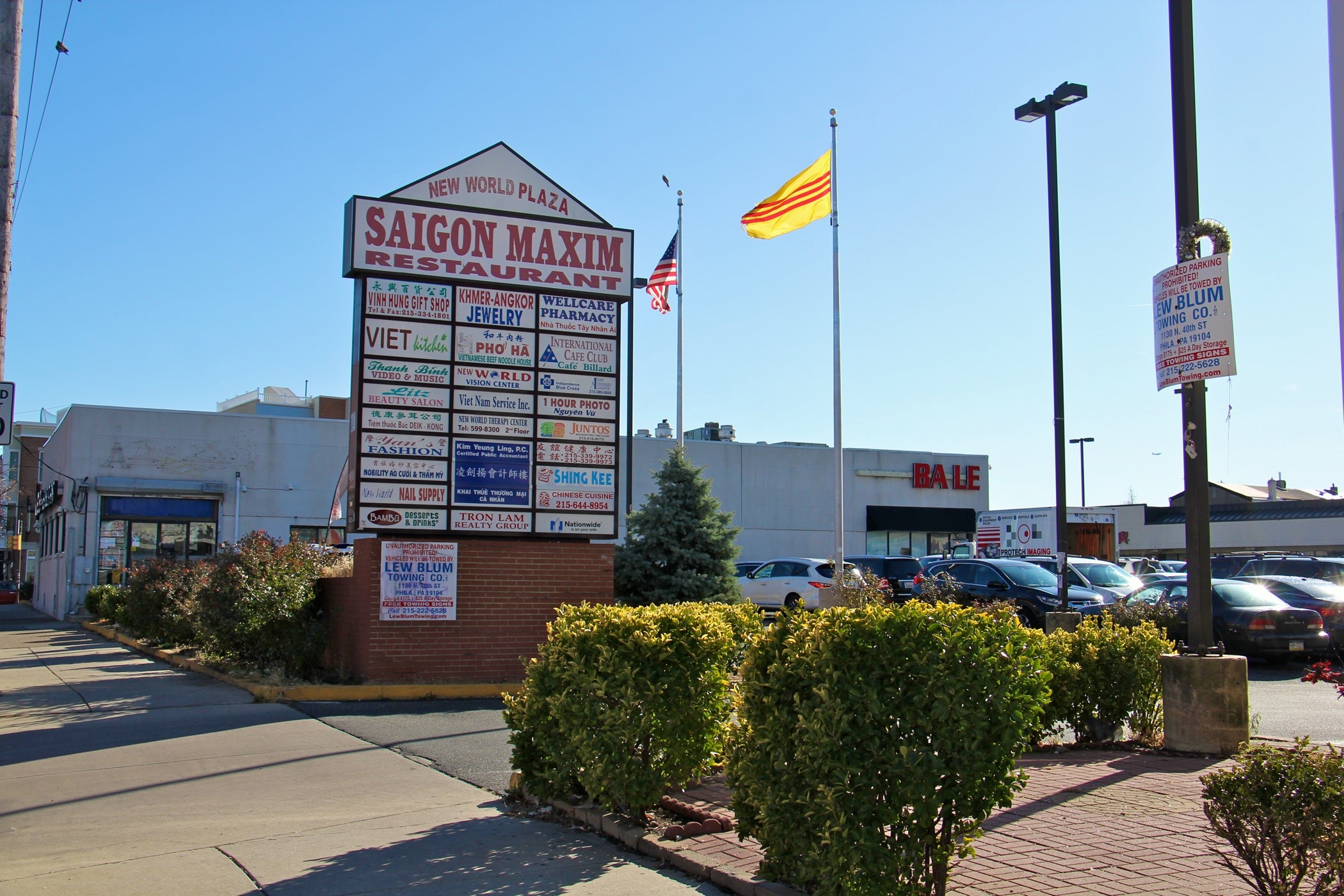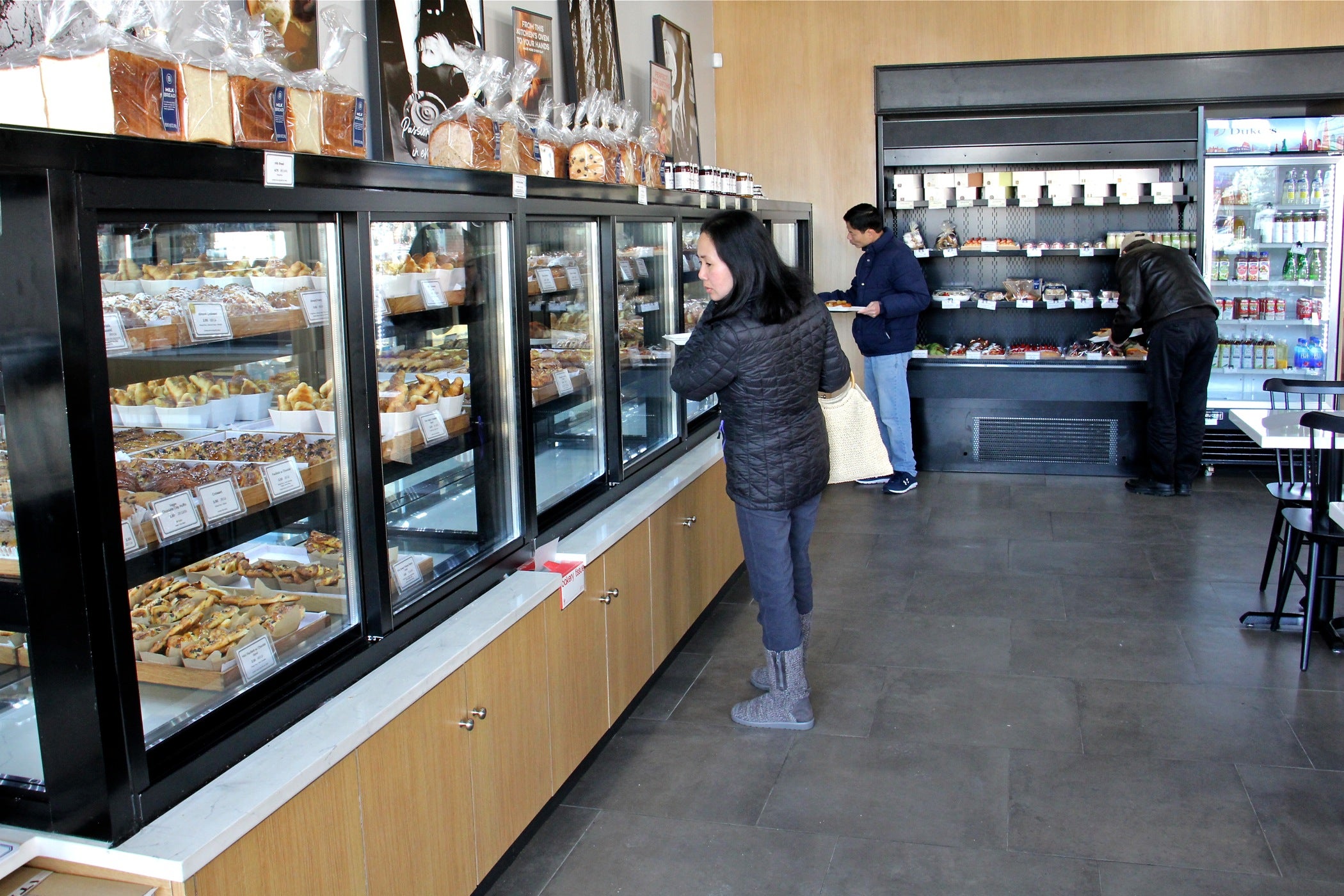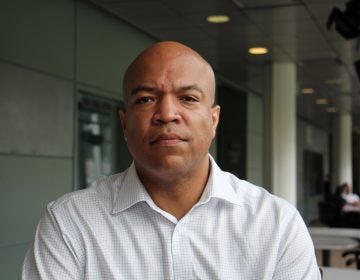Evicted not gone: As Hoa Binh Plaza closes, many nearby Asian businesses thrive
The demise of Hoa Binh Plaza isn’t the only story of Asian businesses in gentrifying areas, leaders in Philly’s growing Asian community say.

New World Plaza at Washington and 6th streets in South Philadelphia (Emma Lee/WHYY)
A pioneering Southeast Asian shopping plaza is about to shut down as a developer prepares to demolish the building to make way for a complex of townhouses and condos.
Some community activists say the pending evictions at Hoa Binh Plaza come as a sign of creeping gentrification that could displace many more longtime businesses in South Philadelphia. But other Asian businesses say they continue to thrive, and the area’s development pressures haven’t hurt them.
Laila Ea is one of the entrepreneurs who has seen business grow in the area. Ea came to Philadelphia from Cambodia in 1988 and now runs her family’s store, Sunshine Jewelry, on Washington Avenue at 7th Street. She’s watched more small businesses open along the avenue recently, including Paris Baguette, an outpost of the South Korea-born bakery cafe chain, and hopes the trend continues.
“Paris Baguette opened at 6th and Washington, which is much needed. Cafes just kind of bring the community up a little bit. I’ve seen an increase in new business that seem to bring more people into this area, which is great. There are new salons opening up, and nail salons, so it’s been good,” Ea said.
The business owner said it has been a while since she visited Hoa Binh Plaza, but when her family first lived in Philadelphia it was their go-to place for groceries, wedding celebrations and parties. “I can remember that plaza just thriving, with all the Asian community from around the suburbs and the city. It was just a really great atmosphere,” she said.
Ea supports continued development to improve the quality of life in the neighborhood, but wants it done in a way that does not displace longtime business owners who are valued by residents, she said.
“I’m kind of torn, because I love seeing development in Philadelphia. I’ve lived here my whole entire life, and I’m kind of remembering what Philadelphia used to be and what it is now. I’m so proud of the city and what it’s become. My only concern about development is that I hope they are aware there are Asian communities in the area that do depend on grocery stores like the one in Hoa Binh,” she said.

A ‘key battle’ in a ‘war’ over neighborhood identity
The evictions of a grocery store, restaurant, nail salon, travel agency and several other businesses at Hoa Binh Plaza have been anticipated since May, when local real estate developer Streamline presented a plan to buy the site on 16th Street near Washington Avenue, raze the nearly 40-year-old mall and build a residential project. Nam Son Bakery, the plaza’s celebrated banh mi restaurant, closed in September.
Community organizations and residents protested the project and the Planning Commission voted to oppose it, leading to a delay of the demolition. But last month, the landlord moved to clear out the tenants, telling them they must vacate their spaces by the end of December. They were offered extensions through February if they signed agreements saying they would not contest the evictions, according to Lan Dinh of VietLead, a community organization that has been working with the business owners and wants to see the plaza preserved.
To Dinh and other community leaders, the closing of the plaza — the first Southeast Asian shopping center in the region — signifies a growing threat. As South Philadelphia property values rise and people with more disposable income move in, some long-established businesses could find themselves replaced by development targeting a more affluent demographic, said Thoai Nguyen, CEO of the Southeast Asian Mutual Assistance Associations Coalition or SEAMAAC.
In a city that, like others in the U.S., struggles with a deep racial wealth gap linked to redlining and other exclusionary policies past and present, the newcomers tend to be white.
“Hoa Binh Plaza is one battle in a much larger war for the shaping of Philadelphia, both demographically and culturally,” Nguyen said.
Nguyen pointed to the opening of a Sprouts grocery in a glassy new development at Broad Street and Washington Avenue last year and to businesses like the gastropubs, vegan bakeries and breweries that have popped up on Washington Avenue and in Point Breeze in the last two to three years.
When Streamline bought the Hoa Binh site, it got a prime chunk of the 19146 zip code, ranked as one of the nation’s fastest-gentrifying in a 2018 analysis of federal data on income, housing values and education levels. Median home values in 19146, which encompasses parts of Point Breeze and Graduate Hospital north of Washington, rose fourfold between 2000 and 2016, according to the analysis.
While the area’s newer stores do attract a multi-ethnic mix of patrons, those shoppers tend to be more affluent than the working-class and immigrant residents who have been buying fresh groceries at Hoa Binh Plaza’s Sieu Thi Big 8 grocery store for decades, Nguyen said.
The plaza’s businesses “serve a cultural niche that’s wider than just Southeast Asian. When you go in there now, you see a lot of Latinx shoppers, you see a lot of African immigrant shoppers, you see a lot of African-Americans. That’s always been encouraging to me. Taking that away is going to be a big loss,” he said.
But Nguyen, like Ea, has also seen other Asian shopping centers in the area continue to thrive. Every weekend, shoppers and restaurant-goers cram the parking lots at two plazas on Washington Avenue at 6th and 11th streets.
Crowds can also be found at Asian grocery stores at 3rd Street and Oregon Avenue and further north on Spring Garden Street at 4th Street, in another gentrifying section of the city.
The demise of Hoa Binh Plaza can’t be read as the only story of Asian businesses in gentrifying areas, according to Andy Toy, the development and communications director at SEAMAAC. He said it’s difficult to gauge the effects of gentrification without doing an in-depth study of what kinds of businesses have operated in various locations over time. Another factor is the rapid growth of the city’s Asian community. In 2015, people who identify as Asian made up 43% of the city’s foreign-born population in the city, according to census data, up from about 30% in 2000.
“There are plenty of newer [Asian businesses] that have opened up in the past few years, so if anything, there are way more today than 10 to 20 years ago when Washington Avenue was mainly contractor/construction businesses,” Toy said. “There is a natural turnover, too, so to me it’s not clear that ‘gentrification’ is pushing out Asian businesses.”

Hoa Binh closing; Nam Som chef opening new spot in NoLibs
Streamline executives have said they want to build commercial space on a parking lot at the corner of 16th and Washington, adjoining the Hoa Binh Plaza site. But Streamline does not own that property and Dinh said the plan does not satisfy the community’s demand that Hoa Binh Plaza be preserved for its cultural and historical significance. It is not clear when the commercial building would be completed and if the rents would be affordable for the Hoa Binh tenants.
Thomas Sinnison, owner of Nam Son Bakery, the first of the plaza’s businesses to close, said he does not plan to reopen the restaurant. However, Nam Son’s former chef Tri Tran will open Hello Vietnam, a new restaurant serving banh mi and other Vietnamese dishes, in Northern Liberties this weekend, according to the Northern Liberties Business Improvement District.
Streamline must seek a zoning variance because Washington Avenue west of Broad Street is zoned for commercial and industrial uses. Dinh of VietLead said she fears the project will encourage more developers to build high-end residential units that will replace longtime commercial spaces.
The closing of the plaza is “a reflection of what can happen all across Washington Avenue,” Dinh said. “We believe that if this variance is granted, this is going to set precedents for a zoning change that could happen throughout the whole area.”
Developments under way or planned for the western portion of Washington Avenue include a project at 24th Street with 80 homes and 8,000 square feet of retail, and a multi-use residential and commercial building at the site of the former Frankford Chocolate Factory at 22nd Street.
The Planning Commission has suggested rezoning the avenue west of Broad Street to expand the types of permitted uses, but Councilman Kenyatta Johnson has declined to follow through. He has acknowledged the demand for more mixed-use development while saying he prefers to have developers seek variances, which requires them to consult with community groups. Johnson did not respond to a request for comment.
In July, the Zoning Board of Adjustment, or ZBA, put Streamline’s variance application on hold so it can update its plan for the site, hold a meeting with Registered Community Organizations (RCOs), and prepare a new zoning application. The move came as a response to fierce community opposition. But Dinh said she met in November with Streamline representatives who told her the evictions would happen first and the promised RCO meeting may not happen until February.
“We were infuriated, because it’s like, ‘Oh, so you’re planning to wait until you can evict all the businesses, so that they can’t represent themselves.’ That’s their plan: they’re stalling the community meeting so that they’re forcing the businesses to close,” she said.
VietLead had been preparing to obtain legal counsel to help the business owners fight the variance before the ZBA. Since it would take months to schedule a new ZBA hearing and move the project forward, evictions at this time serve no practical purpose except as a way to silence the business owners, Dinh argued.
Streamline does not yet own the plaza site and has denied any direct role in the evictions, saying that under its purchase agreement the site’s current owners are required to deliver the property free of tenants.
Dinh said the plaza business owners were given until November 22 to agree to terms and sign contracts that would allow them to stay through February. Pro bono lawyers who are now assisting the business owners have contacted the landlord, asking for more time for them to decide whether to sign the agreements, and had not heard back as of last week, she said.
At her jewelry store several blocks away, Laila Ea said she is rooting for those business owners to survive.
“If people are coming to develop in our area for the better, I just hope they give opportunities for the Asian-American business owners. You could put apartments up top and retail on the bottom, giving them the option to have a storefront, instead of just saying, ‘sorry, we’re done, you have to leave.’ Those owners have been there for generations and to just put them out is just really unfair to people in the community that depend on going to the businesses,” she said.
WHYY is your source for fact-based, in-depth journalism and information. As a nonprofit organization, we rely on financial support from readers like you. Please give today.







